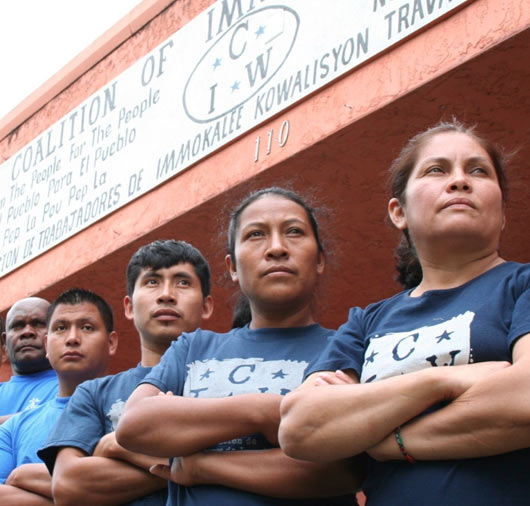NAMA's Coordinating Director
Last time I fasted for a political reason was in 1992. I was living in Chester, West Virginia; working with community advocates fighting the WTI Incinerator, the world’s largest toxic waste incinerator across the river in East Liverpool, Ohio. For 44 days the work, not food, is what fed my body. I know the experience was spiritually and physically significant for all 25 of us who took part. Personally, I was humbled by the experience and knowing so many of my heroes had endured much more grueling fasts and hunger strikes to bring an end to injustices around the world.
Twenty years later, I find myself moved to fast again. This time in support of the Fast for Fair Food campaign in solidarity with the Coalition of Immokalee Workers (CIW), a community-based organization of mainly Latino, Mayan Indian and Haitian immigrants working in low-wage jobs throughout the state of Florida. The fast is to start on March 5, 2012.
Since 1993, the CIW has led an inspiring effort to end the injustices facing farmworkers working in grueling conditions, often literally as slaves, so we can have our favorite land based foods. Inadequate pay, living arrangements, and protections from the elements have made an already backbreaking work unbearable. CIW has successfully negotiated contracts with major food retailers and restaurants such as Taco Bell, McDonald’s, Burger King, Bon Appétit Management, Sodexo and even Amtrak that would commit them to only buy from farms who are paying their workers a fairer wage and providing them with humane working conditions. Most recently, after much negotiation, Trader Joe’s stepped up to the plate.
What does all this have to do with fisheries and fishermen? Our food system includes what we get from the ocean. Not only do we eat from the ocean directly, but we also eat marine animals indirectly when they are applied as fertilizer on our farms, fed to our farm animals as part of their feed or taken as supplements to our diets.
But whether we are paying fishermen a fair price, working conditions for fishworkers around the globe or whether the system that manages our food from the ocean from dock to plate is a fair one isn’t part of the conversation around sustainable, fair, safe and sovereign food system. Those responsible for managing our fisheries don’t take whether fishing is being done for the greater benefit to our food system in consideration. Department of Commerce praises those who catch the most amounts of fish with their annual reports naming the top 3 ports, but fails to address the fact that fair pay for smaller catches is probably better for the ocean.
So I’m fasting for the fish and the fishermen who bring our marine based foods to our plate. I know by continuing to make the connections and building solidarity with farmworkers and farmers we can make sure the community based fleet is paid a fair wage, is doing honorable work that saves our ocean, puts food on our table and sustains our coastal communities.
If you can, I hope you will consider joining me in this fast for a fair and just food system that includes our SEAfood.
You can show your support for community based fishing by taking part in a public process currently underway to amend fisheries policies. Public comments on the fleet diversity amendment 18 are due March 1st, and every comment counts. Please visit this link for more information.



i hope your sacrifice brings much needed attention to these vital issues! I'm sorry I didn't read this early enough to comment.
ReplyDelete